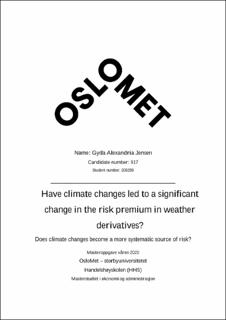Have climate changes led to a significant change in the risk premium in weather derivatives? Does climate changes become a more systematic source of risk?
Master thesis
Published version
Permanent lenke
https://hdl.handle.net/11250/2824011Utgivelsesdato
2020Metadata
Vis full innførselSamlinger
Sammendrag
The purpose of the thesis is to investigate whether the climate changes up until now have had a significant effect on the risk premium in weather derivatives. Weather futures are futures built on weather indices. In this paper I will focus on weather futures built on the HDD weather index. The total risk of an asset is split into firm-specific risk and systematic risk. If higher return is required by investors in order to be compensated for changes in the sensitivity of the weather futures to systematic risk, either changes in the sensitivity to general economic factors or changes in the sensitivity to risk factors related to climate, it should be captured by the assets beta. In the analysis I will look for changes in beta due to climate changes which would indicate a change in the risk premium tied to climate changes. In order to investigate the thesis and perform the analysis I have gathered data on climate, prices of weather futures on HDD on Chicago and New York, and some data on general economic factors. I use both the capital asset pricing model and the arbitrage pricing theory to build linear regression models to test the thesis. This is in order to see which of the models better explain the return on the weather futures and gives the most reliable results. To tie changes in systematic risk to climate changes I make interaction terms between the climate variables chosen and the risk factors included in the asset pricing models. I also perform a Chow test to look for breaks in the data that could indicate a change in the systematic risk. In addition I run a linear regression in which I make an interaction term between the risk factors in the asset pricing models and the dummy variable year to look for changes in the systematic risk after 2011 in case the climate variables chosen does not capture climate changes properly or how weather futures are affected by climate changes. The expectation is that the arbitrage pricing theory will be a better model for explaining the return on weather futures than the capital asset pricing model. In the regression results, there are evidences of significant changes in the systematic risk due to climate changes for weather futures on Chicago when using the arbitrage pricing theory. For New York weather futures it is hard to find evidence of significant changes in the systematic risk tied to climate changes.
